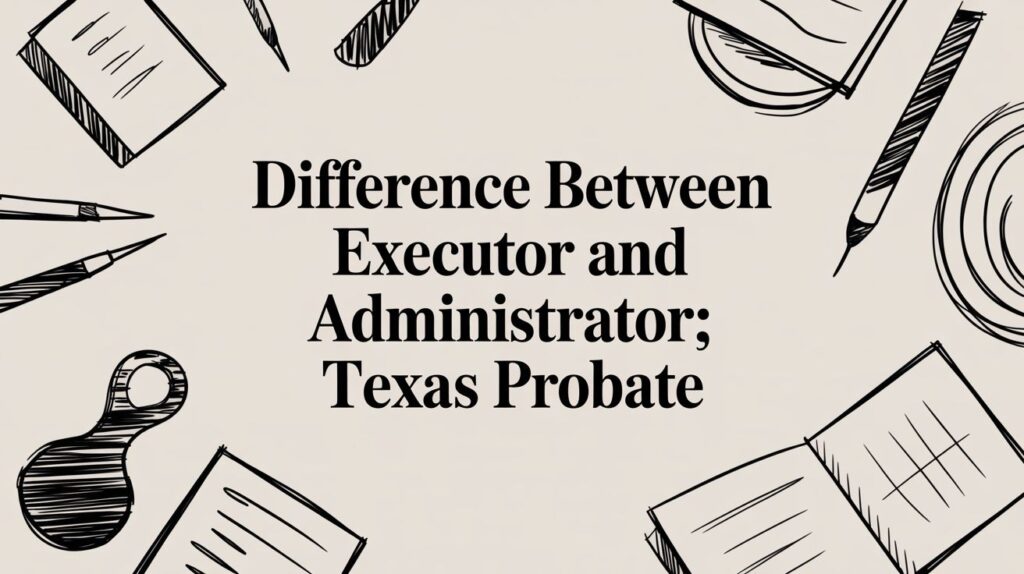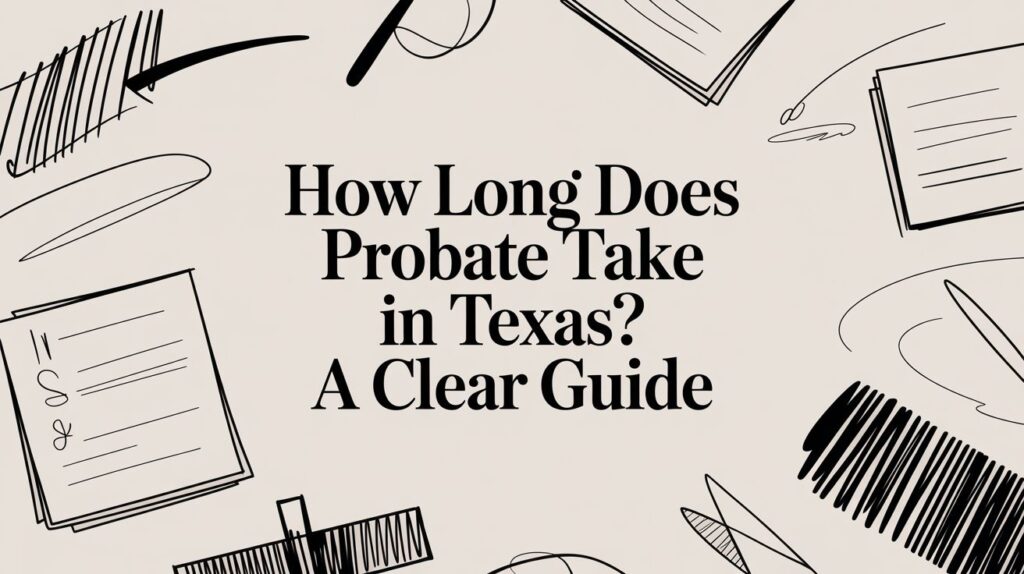When a loved one passes away, the emotional toll is already heavy—but the legal responsibilities that follow can add layers of stress. Chief among those responsibilities is probate. For many, the first and most pressing question is, “How long will this take?” That’s where estimating time for probate completion becomes more than a curiosity—it’s a key part of planning, closure, and moving forward.
In Texas and many other states, the probate process can be as short as a few months or as long as several years. Why such a wide gap? Because no two estates are alike. Some are straightforward, with clear wills and cooperative heirs. Others are complex, with missing documents, creditor claims, or disputes over who gets what. In this article, we’ll take a deep dive into understanding probate timelines for quick completion, using real-life examples, step-by-step explanations, and practical advice to help you grasp the process with clarity and confidence.

Probate Definition: What It Is and How It Works
The Legal Mechanism Behind Asset Transfer
Before we explore timing, let’s make sure we understand what probate actually is. Probate is the legal process of validating a person’s will (if they left one), identifying and inventorying their property, paying debts and taxes, and distributing the remaining assets to heirs or beneficiaries.
If there’s no will, the estate is still subject to probate—but the process follows state intestacy laws rather than the deceased’s wishes.
At its core, probate is about accountability. The court ensures everything is handled legally and fairly, particularly when money, real estate, or family dynamics are involved.
Understanding this foundation is critical to estimating time for probate completion, since each phase adds to the overall timeline.
The Basic Timeline of Probate in Texas
From Filing to Final Distribution
While every case is unique, the average probate timeline for a straightforward estate in Texas typically runs between 6 to 9 months. But there’s a catch—that’s assuming everything goes smoothly.
Let’s break down the timeline step-by-step:
- Initial filing and court hearing – 2 to 4 weeks
- Appointment of personal representative (executor or administrator) – 1 to 2 weeks after hearing
- Notice to creditors and heirs – Begins within 30 days of appointment
- Inventory and appraisal of estate assets – 90 to 120 days
- Paying debts and taxes – Ongoing, but often takes 3 to 6 months
- Distribution of remaining assets and final accounting – 2 to 3 months
- Court review and closure of probate – 4 to 8 weeks
Adding it all up, even a simple probate case usually takes 7 to 12 months from start to finish. That’s why understanding probate timelines for quick completion helps set realistic expectations for executors and heirs alike.
Real-Life Story: The Quick and the Complicated
James, a 42-year-old architect in Austin, was named executor of his uncle’s estate. The will was clear, there were only a few assets (a house, a car, and a checking account), and no debts. Thanks to proactive planning, James had the estate closed within seven months.
Contrast that with Maria in El Paso, who handled her father’s estate. He left no will, there were disputes between half-siblings, and a tax lien on the property. The process dragged on for over two years, involving multiple hearings and court delays.
These cases illustrate why estimating time for probate completion depends on so many moving pieces.
Factors That Influence Probate Timelines
The Good, the Bad, and the Unexpected
No matter how well you plan, some variables are out of your control. Here’s what can speed up—or slow down—the probate process:
1. Presence of a Valid Will
- ✅ Speeds it up: A legally executed will, with clear beneficiaries and a named executor
- ❌ Slows it down: No will, lost will, or conflicting versions
2. Cooperation Among Heirs
- ✅ Speeds it up: All beneficiaries agree and communicate well
- ❌ Slows it down: Disputes, jealousy, or lack of contact
3. Debt and Creditor Claims
- ✅ Speeds it up: Minimal debts, or no claims filed
- ❌ Slows it down: Creditors must be paid in full before assets are distributed
4. Type and Location of Assets
- ✅ Speeds it up: All assets in one state and easily accessible
- ❌ Slows it down: Multiple properties in different jurisdictions
5. Court Backlog
- ✅ Speeds it up: Smaller counties or less congested court dockets
- ❌ Slows it down: Urban areas or holidays that delay hearings
The more complex the estate, the more vital understanding probate timelines for quick completion becomes. Each wrinkle adds days, weeks, or even months.
Can Probate Be Completed in Under Six Months?
The Ideal Scenario
Yes, but it’s rare. Completing probate in under six months typically requires:
- A valid, uncontested will
- No real property or only one piece of easily transferred real estate
- Minimal debts and known creditors
- Full cooperation from all heirs
- A proactive executor who files everything promptly
- A court with fast scheduling and minimal backlog
This kind of “clean file” is the exception, not the rule. Still, it’s possible with proper planning, especially if the executor works closely with a probate attorney who understands local court procedures.
For families hoping for closure quickly, estimating time for probate completion should still lean toward the cautious side—even when everything seems ideal.

Common Delays in the Probate Process
What Trips People Up the Most
Let’s look at the top reasons probate takes longer than expected:
Disputes Over the Will
Contested wills can freeze the entire process for months—or even years. Heirs may argue over:
- Validity of the signature
- Mental capacity of the deceased
- Alleged coercion or fraud
- Omitted or unfairly treated family members
Failure to Notify Heirs or Creditors Properly
In Texas, you must legally notify all interested parties. If this isn’t done right, the court can invalidate your filings or demand a new notice period—costing weeks or more.
Inventory Errors
Underreporting, missing assets, or vague descriptions can trigger court questions or require reappraisals. A complete and well-documented inventory is a cornerstone of understanding probate timelines for quick completion.
Tax Issues
Estate taxes at the federal level (and property taxes at the local level) must be resolved before distributions are approved. Unexpected tax bills can hold everything up.
Alternatives That May Bypass Full Probate
Small Estate Affidavits and Muniment of Title
Not every estate needs to go through formal probate. If you want to save time, explore alternatives that might fit your situation:
Small Estate Affidavit (SEA)
- Available if the estate’s total value (not including the homestead) is under $75,000
- No real disputes or complications
- Can be used to transfer assets like bank accounts and vehicles

Muniment of Title
- Available if there’s a valid will and no unpaid debts
- Allows heirs to transfer title to property without appointing an executor
- Much faster than standard probate
These are great tools to consider when estimating time for probate completion, especially if you’re trying to avoid lengthy court proceedings.
Tips for Speeding Up the Probate Process
Efficiency Is Everything
If you’re hoping for a quicker resolution, here are ways to move things along:
- Get Organized Early
Gather wills, deeds, titles, tax records, and insurance policies as soon as possible. - Hire a Probate Attorney
Someone familiar with your county court can file paperwork correctly and avoid delays. - Stay in Communication
Regular updates with heirs, attorneys, and the court clerk can keep everyone on track. - Submit Documents on Time
Missing even one deadline can create a cascade of new scheduling delays. - Avoid Disputes
Encourage open dialogue among beneficiaries, and resolve disagreements outside of court when possible.
Even small steps can shave weeks off the timeline. That’s why experienced executors always keep understanding probate timelines for quick completion at the top of their list.

Real-Life Case: Probate in 8 Months with Strategic Planning
Tracy in San Antonio handled her aunt’s estate after her passing. Her aunt had a straightforward will, one checking account, and a paid-off home. Tracy worked with a local attorney, sent out notices immediately, and had the property appraised within weeks.
By being proactive and responsive, Tracy closed probate in just over eight months—well within the average and without any unexpected surprises. The secret? Clear communication, prompt filings, and staying ahead of the deadlines.
Stories like Tracy’s show that estimating time for probate completion isn’t just about luck—it’s about smart planning.
Final Thoughts on Understanding Probate Timelines for Quick Completion
Probate may be a legal process, but it’s also a personal journey—filled with emotion, family dynamics, and, often, a pressing desire for closure. Whether you’re an executor trying to honor someone’s final wishes or a beneficiary waiting for resolution, understanding probate timelines for quick completion can ease the burden and help you move forward.
While there’s no universal answer to how long probate takes, being informed, prepared, and proactive can make a major difference. With the right tools and support, a process that feels overwhelming can turn into one that’s manageable—even efficient.
So, don’t just hope for a quick outcome—plan for it. And when in doubt, consult a probate attorney familiar with your jurisdiction. Their insight into local court practices can be the key to wrapping things up faster than you thought possible.








